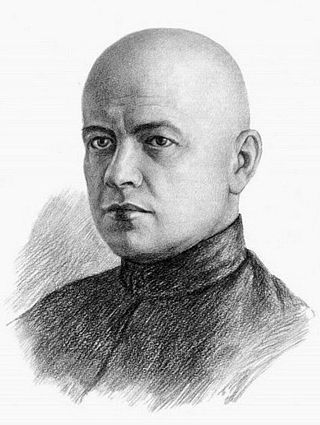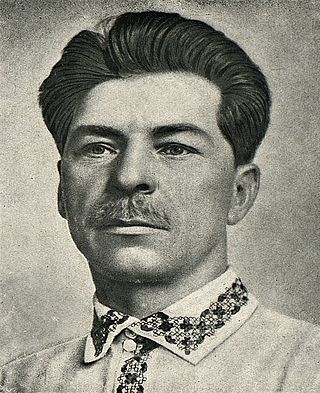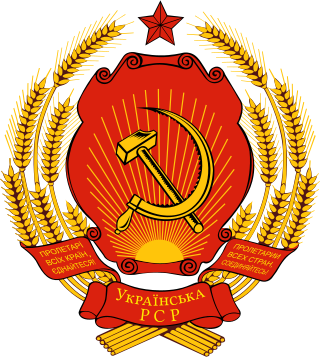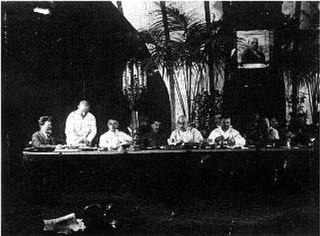
Stanisław Vikentyevich Kosior, sometimes spelled Kossior, was a Soviet politician who was First Secretary of the Communist Party of Ukraine, Deputy Premier of the Soviet Union and member of the Politburo of the Communist Party of the Soviet Union (CPSU). He and his wife were both executed during the Great Purge.

Pavel Petrovich Postyshev was a Soviet politician, state and Communist Party official and party publicist. He was a member of Joseph Stalin's inner circle, before falling victim to the Great Purge. In 2010, a court in Kyiv judged Postyshev guilty of complicity in genocide because of his part in causing the mass starvation in Ukraine in the early 1930s, known as the Holodomor.

Mykola Oleksiiovych Skrypnyk, was a Ukrainian Bolshevik revolutionary and Communist leader who was a proponent of the Ukrainian Republic's independence, and later led the cultural Ukrainization effort in Soviet Ukraine. When the policy was reversed and he was removed from his position, he committed suicide rather than be forced to recant his policies in a show trial. He also was the Head of the Ukrainian People's Commissariat, equivalent to the modern-day position of Prime Minister of Ukraine.

The Communist Party of Ukraine was the founding and ruling political party of the Ukrainian SSR operated as a republican branch of the Communist Party of the Soviet Union (CPSU).

All-Ukrainian Central Executive Committee was a representative body of the All-Ukrainian Congress of Soviets. It was the supreme legislative, administrative, executive controlling state power of Soviet Ukraine between the sessions of the Congress of Soviets that acted between 1917 until 1938. In the very beginning this institution was established as the Central Executive Committee of Soviet of Ukraine at the First All-Ukrainian Congress of Soviets in Kharkiv on December 24–25, 1917. At the same congress was elected the People's Secretariat of Ukraine.

The Ukrainian People's Republic of Soviets was a short-lived (1917–1918) Soviet republic of the Russian SFSR that was created by the declaration of the Kharkov All-Ukrainian Congress of Soviets "About the self-determination of Ukraine" on 25 December [O.S. 12 December] 1917 in the Noble Assembly building in Kharkov. Headed by the Provisional Workers' and Peasants' Government of Ukraine formed earlier in Russian Kursk. The republic was later united into the Ukrainian Soviet Republic and, eventually, liquidated, because of a cessation of support from the government of the Russian SFSR when the Treaty of Brest-Litovsk was signed.

The All-Ukrainian Congress of Soviets was the supreme governing body of the Ukrainian Soviet Socialist Republic from 1917–38. From 1922 to 1938 the Constitution of the Ukrainian SSR designated after the 1918 Russian Constitution mandated that Congress to be convened at least twice a year. The 1926 Constitution lowered the minimum to once a year.

The Central Committee (CC) composition was elected by the 10th Congress, and sat from 16 March 1921 until 2 April 1922. The CC 1st Plenary Session renewed the composition of the Politburo, Secretariat and the Organizational Bureau (OB) of the Russian Communist Party (Bolsheviks).

The Central Committee (CC) composition was elected by the 11th Congress, and sat from 2 April 1922 until 25 April 1923 . The CC 1st Plenary Session renewed the composition of the Politburo, Secretariat and the Organizational Bureau (OB) of the Russian Communist Party (Bolsheviks).

The Central Committee (CC) composition was elected by the 13th Congress, and sat from 2 June 1924 until 31 December 1925. The CC 1st Plenary Session renewed the composition of the Politburo, Secretariat and the Organizational Bureau (OB) of the All-Union Communist Party (Bolsheviks).

The Central Committee (CC) composition was elected by the 15th Congress, and sat from 19 December 1927 until 13 July 1930. The CC 1st Plenary Session renewed the composition of the Politburo, Secretariat and the Organizational Bureau (OB) of the All-Union Communist Party (Bolsheviks).
The Central Committee (CC) composition was elected by the 16th Congress, and sat from 13 July 1930 until 10 February 1934. Its 1st Plenary Session elected the Politburo, Secretariat and Orgburo. The 16th Congress was the first party convention since the 13th Congress which saw no organized opposition, and the first congress in party history in which there was no opposition to the party leadership. Ukrainian historian Oleg Khlevniuk considers the period 1930–1934 to be a "transitional period" between collective leadership (referred to interchangeably by him as oligarchy) and Joseph Stalin's personal dictatorship (autocracy). The removal of Alexei Rykov, the Chairman of the Council of People's Commissars (SNK, the Soviet government), from the Politburo at the 1st Joint Plenary Session of the CC and the Central Control Commission (CCC) has been marked in historic literature as "the definitive Stalinization of that body [Politburo]" according to Khlevniuk.

The Central Committee of the 17th Congress of the All-Union Communist Party (Bolsheviks) sat from 10 February 1934 until the convening of the 18th Congress on 10 March 1939. Its 1st Plenary Session elected the Politburo, Secretariat and Orgburo. The 17th Congress was labelled the "Congress of Victors" to mark the success of the first five-year plan and the collectivization of agriculture. The CC 1st Plenary Session elected Joseph Stalin General Secretary of the Central Committee, and Lazar Kaganovich continued to serve as Stalin's deputy, an informal post referred to by Sovietologists as Second Secretary, and was empowered to manage party business and sign Politburo resolutions when Stalin was away from Moscow.
The Central Committee of the 19th Congress of the Communist Party of the Soviet Union (CPSU) was in session from 1952 until 1956. It elected, at its 1st Plenary Session, the Presidium, the Secretariat and the Party Control Committee.
The Odesa Regional Committee of the Communist Party of Ukraine, commonly referred to as the Odesa CPU obkom, was the position of highest authority in the Odesa Oblast, in the Ukrainian SSR of the Soviet Union. The position was created on February 27, 1932, and abolished in August 1991. The First Secretary was a de facto appointed position usually by the Central Committee of the Communist Party of Ukraine or the First Secretary of the Communist Party of Ukraine.

Alexander Yakovlevich Shumsky or Oleksandr Yakovych Shumskyi was a Ukrainian communist and activist. He was one of the leaders of the national communism movement in Ukraine and actively supported Ukrainization. He was one of the victims of the Stalinist regime, being arrested and killed by the NKVD in 1946. He was rehabilitated in 1958, during the period of De-Stalinization.

The All-Union Party «Union of Communists» is a communist party created in 1991 in the USSR, operating in the territory of the countries of the former Soviet Union, the second communist party created after the dissolution of the Communist Party of the Soviet Union (CPSU).

The 1st Congress of the CP(b)U was held in Moscow in July 5–12, 1918. It was a constituent congress which led to creation of the political party by way of uniting existing Russian Bolsheviks in Ukraine and left faction of the Ukrainian Social-Democrats. The congress took place at address ulica Rozhdestvenka, 11. Today in the building is located MArchI.
Galina Yevgeniya Burkatskaya was a Soviet activist of the collective farm movement, twice Hero of Socialist Labor. Member of the Central Committee of the Communist Party of Ukraine in 1952-1966. Deputy of the Supreme Soviet of the USSR of the 3rd-6th convocations, member of the Presidium of the Supreme Soviet of the USSR (1958-1962). Member of the Central Audit Commission of the Communist Party of the Soviet Union (CPSU) in 1961-1966.
The 3rd Congress of the CP(b)U was held in Kharkiv in March 1–6, 1919 during the Ukrainian-Soviet War.


















